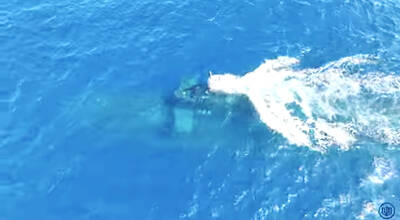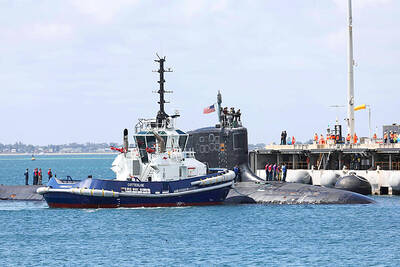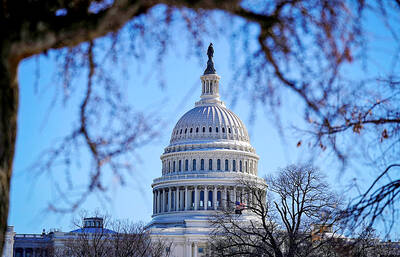Palestinians urged Israel yesterday to expand a prisoner release to ensure the success of a summit both sides hope will result in a formal declaration to end violence.
Israel had disappointed the Palestinian leadership by refusing to include those jailed for deadly attacks among the 900 prisoners whom Israeli Prime Minister Ariel Sharon and top Cabinet ministers agreed on Thursday to release in a goodwill gesture.
But the summit itself, which is scheduled for Tuesday, between Sharon and new Palestinian President Mahmoud Abbas in Egypt's Red Sea resort of Sharm el-Sheikh, appeared set to go ahead.
"Israel stuck to its criteria of not releasing those it described as having `blood on their hands,'" Palestinian negotiator Saeb Erekat said after talks with Israeli officials about the issue broke up late on Thursday without agreement being reached.
"That means that all the prisoners who were jailed before [interim peace deals] in 1993 will not be released," he said.
Freedom for some 8,000 prisoners, especially Islamic militants and veteran inmates, is key to Abbas' aim of consolidating power, ending bloodshed and reviving a US-backed peace "road map" charting mutual steps to Palestinian statehood.
If unresolved as the summit draws nearer, the prisoners issue could loom large in meetings new US Secretary of State Condoleezza Rice is scheduled to hold with Sharon and Abbas during a visit to the region tomorrow and Monday.
During deliberations on a confidence-building package for the Palestinians on Thursday, Sharon faced strong opposition from several Cabinet members to suggestions by other ministers to bend the terms for release, political sources said.
Rice, in London, said efforts to achieve Middle East peace were now "moving effectively" and cited Abbas' views on "the necessity to have a peaceful resolution" of the conflict.
"The fact is, though, that there will have to be action to make certain that terrorists cannot continue to frustrate both his plans and to endanger the lives of Israelis," she told a news conference.
Israeli officials said a first batch of 500 prisoners would be freed next week, after the summit, with 400 to follow over a period of three months.
Israel's plan also calls for a troop pullback from five West Bank cities, starting in Jericho next week, after the talks.
Meanwhile, Israeli security officials yesterday morning said they had 50 intelligence warnings of Palestinian militants planning to launch attacks, Israeli media reported.
The officials said that most of the attacks were being prepared by independent cells of Fatah militants. They accused the southern Lebanese Islamic fundamentalist Hezbollah movement of funding the renegade cells.
Hezbollah seeks to destroy the relative calm of the past two weeks, ahead of next Tuesday's summit in Egypt, they said.
The accusations follow a day of renewed attempts by militants in the West Bank and Gaza to launch attacks, despite an informal ceasefire extracted by Abbas from leaders of the radical Hamas and Islamic Jihad movement.
Also see story:

CSBC Corp, Taiwan (台灣國際造船) yesterday released the first video documenting the submerged sea trials of Taiwan’s indigenous defense submarine prototype, the Hai Kun (海鯤), or Narwhal, showing underwater navigation and the launch of countermeasures. The footage shows the vessel’s first dive, steering and control system tests, and the raising and lowering of the periscope and antenna masts. It offered a rare look at the progress in the submarine’s sea acceptance tests. The Hai Kun carried out its first shallow-water diving trial late last month and has since completed four submerged tests, CSBC said. The newly released video compiles images recorded from Jan. 29 to

DETERRENCE EFFORTS: Washington and partners hope demonstrations of force would convince Beijing that military action against Taiwan would carry high costs The US is considering using HMAS Stirling in Western Australia as a forward base to strengthen its naval posture in a potential conflict with China, particularly over Taiwan, the Wall Street Journal reported on Saturday. As part of its Indo-Pacific strategy, Washington plans to deploy up to four nuclear-powered submarines at Stirling starting in 2027, providing a base near potential hot spots such as Taiwan and the South China Sea. The move also aims to enhance military integration with Pacific allies under the Australia-UK-US trilateral security partnership, the report said. Currently, US submarines operate from Guam, but the island could

RESTRAINTS: Should China’s actions pose any threat to Taiwan’s security, economic or social systems, China would be excluded from major financial institutions, the bill says The US House of Representatives on Monday passed the PROTECT Taiwan Act, which states that Washington would exclude China from participating in major global financial organizations if its actions directly threaten Taiwan’s security. The bill, proposed by Republican Representative Frank Lucas, passed with 395 votes in favor and two against. It stipulates that if China’s actions pose any threat to Taiwan’s security, economic or social systems, the US would, “to the maximum extent practicable,” exclude Beijing from international financial institutions, including the G20, the Bank for International Settlements and the Financial Stability Board. The bill makes it clear that China must be prepared

Taiwanese trade negotiators told Washington that Taipei would not relocate 40 percent of its semiconductor production to the US, and that its most advanced technologies would remain in the nation, Vice Premier Cheng Li-chiun (鄭麗君) said on Sunday. “I told the US side very clearly — that’s impossible,” Cheng, who led the negotiation team, said in an interview that aired on Sunday night on Chinese Television System. Cheng was referring to remarks last month by US Secretary of Commerce Howard Lutnick, in which he said his goal was to bring 40 percent of Taiwan’s chip supply chain to the US Taiwan’s almost